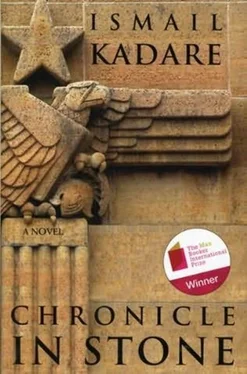Ismaíl Kadaré - Chronicle in Stone
Здесь есть возможность читать онлайн «Ismaíl Kadaré - Chronicle in Stone» весь текст электронной книги совершенно бесплатно (целиком полную версию без сокращений). В некоторых случаях можно слушать аудио, скачать через торрент в формате fb2 и присутствует краткое содержание. Жанр: Современная проза, на английском языке. Описание произведения, (предисловие) а так же отзывы посетителей доступны на портале библиотеки ЛибКат.
- Название:Chronicle in Stone
- Автор:
- Жанр:
- Год:неизвестен
- ISBN:нет данных
- Рейтинг книги:4 / 5. Голосов: 1
-
Избранное:Добавить в избранное
- Отзывы:
-
Ваша оценка:
- 80
- 1
- 2
- 3
- 4
- 5
Chronicle in Stone: краткое содержание, описание и аннотация
Предлагаем к чтению аннотацию, описание, краткое содержание или предисловие (зависит от того, что написал сам автор книги «Chronicle in Stone»). Если вы не нашли необходимую информацию о книге — напишите в комментариях, мы постараемся отыскать её.
Chronicle in Stone — читать онлайн бесплатно полную книгу (весь текст) целиком
Ниже представлен текст книги, разбитый по страницам. Система сохранения места последней прочитанной страницы, позволяет с удобством читать онлайн бесплатно книгу «Chronicle in Stone», без необходимости каждый раз заново искать на чём Вы остановились. Поставьте закладку, и сможете в любой момент перейти на страницу, на которой закончили чтение.
Интервал:
Закладка:
It was one of those days when the power of words was at its peak. I was scouring the sloped roofs to see if I could find out where love had hidden before smiting a young man with its arrow. But unlike even small stones thrown down from that height, love didn’t make you bleed or leave a bump on your head. Why, then, in spite of that, did people complain about it so much, especially when it landed on a girl?
I was rescued from these thoughts by a knocking at the door that echoed through the whole house. We all recognised Xhexho’s knock. But the way she knocked this time, and the short spaces between blows, told us that something unusual had happened. With a worried look on her face, Mamma went down to open the door, while Grandmother stood waiting at the top of the stairs.
Then she too went down. The upper floors fell silent. The door opened. Someone came in. Someone else went out. Then someone came in again. The muffled sounds of women’s voices reached my ears. I tiptoed down the steps, trying not to attract attention. There was definitely something serious going on downstairs. The door creaked again. A hum of words I could not clearly distinguish filled the air like a haze. No one noticed me. They were standing by the railing next to the cistern, at the foot of the stairs. Besides Xhexho there was Nazo and her daughter-in-law, as well as Kako Pino, Bido Sherifi’s wife, and another neighbour. The frantic look in their eyes, the way Xhexho’s scarf had slid back to reveal a tuft of greyish hair, and the marks on their cheeks from recent gestures of indignation all told me that something irreparable had occurred. They were all talking at once. Something monstrous had indeed happened, but I couldn’t figure out what was. It wasn’t death or madness. Something worse. Xhexho stood in the centre of them all, and her grating wheeze, like a black-smith’s bellows, fanned their fear.
I listened for a long time, but I still couldn’t understand what it was all about. They were talking about some kind of house. The Italians had opened a business of some kind. It was called something that sounded quite easy. It was a word that had the sound “board” in it, like “boarding house”. Yet they were terrified. They cursed it. I had heard about a sugar house where beautiful young girls lived. This one must have been made of poison to throw the whole city into such turmoil.
“One man from every house,” Xhexho said, her voice low and strange. “That’s what they said. And if they don’t go of their own accord, they’ll be dragged there by brute force. One male from every family.”
The women pinched their cheeks again. Only Nazo’s daughter-in-law seemed unmoved. Xhexho cast her eyes about. They fell on me.
“Don’t you get any ideas about going there!” she exclaimed.
“Idiot,” said Grandmother. “Leave the boy alone.”
“The end of the world,” said Kako Pino, for at least the hundredth time
“Will our folk ever come to their senses?” Xhexho cried, addressing Grandmother as if she were the representative of the city.
Just then there was another knock at the door. It was Aunt Xhemo.
“What’s the matter, poor things? Why are you so upset?” she asked, the moment she set foot in the hallway.
Aunt Xhemo didn’t come to visit us very often, maybe two or three times a year. She was tall and straight and seemed to be all skin and bone. In the family she was known for her mania for cleanliness. She would never eat anything that had been touched by someone else. Bread, all her meals, coffee, tea – she prepared everything with her own hands. At home, she kept her own spoon, plate, cup and coffee pot separate. If she went visiting, she would bring along her own bread wrapped in a clean cloth, and her coffee pot, cup, spoon and glass wrapped in another. Everyone understood her mania, and no one was offended when she sat down at the table and unwrapped her simple fare.
Aunt Xhemo listened in silence as the other women discussed the strange new establishment.
“You’re crazy to go on like this,” she finally said. “I was wondering what was happening. I thought they were opening this… this what do you call it, this communal canteen.”
Aunt Xhemo had always been worried about the existence of canteens. In her mind it was the worst possible calamity.
“Why are you fretting over a bordello?” she cried. “I could understand someone with a young husband being concerned,” she said, glancing at Nazo’s daughter-in-law. “But why should you care? Don’t be so silly!”
Nazo’s daughter-in-law smiled and, to everyone’s astonishment, put her hand to her mouth, and burst out laughing. Nazo nudged her in the ribs with her elbow.
The gathering adjourned. Grandmother and Aunt Xhemo slowly climbed back up the two flights of wooden stairs.
“Whatever will we hear about next, Selfixhe?” Aunt Xhemo sighed.
“When foreigners set foot in the country, you have to be ready for anything,” Grandmother answered. “A young girl can’t sit in the window any more without the Italians taking out pocket mirrors and flashing signals at her.”
“It was obvious from the day they arrived that they were fops,” said Aunt Xhemo. “God knows I’ve seen my share of armies, but I never thought I’d come across soldiers wearing perfume.”
“If that were all, I wouldn’t mind. But what I don’t like is what they’re doing down there,” said Grandmother, nodding towards the airfield.
Aunt Xhemo sighed. “War is at our doorstep, Selfixhe.”
Meanwhile, the women at their windows kept talking about the new business in the house they called a “board”. All the lightning in the heavens was called down upon it. A hundred times a day it was consumed by flames, reduced to ashes, but it must have arisen from those ashes every time, for the curses continued to rain down.
A new wave of katenxhikas flooded the streets and alleys. The cold wind still blew from the northern mountain passes, fluttering the black scarves of the katenxhikas and making their eyes water with teardrops that filled out like glass beads. They walked up and down, never stopping.
The city was truly sick. Now it was easy to see it sweating. Windows often shivered convulsively. Chimneys groaned. Every night the searchlight’s one eye lit up. Polyphemus. I dreamed of creeping up on it with a red-hot poker to put out that horrible eye. And I imagined the blinded searchlight would scream with pain all night long.
They were troubled times, and everything was uncertain. I thought of the shifting landscape around Grandfather’s house. It looked as if the ground around our house would soon start moving too. Everyone thought so.
Ilir raced down Fools’ Alley.
“Guess what?” he said, as he came through the door. “The world is round like a melon. I saw it at home. Isa brought it. It’s round, perfectly round, and it spins without stopping.”
He took a long time to tell me just what he had seen.
“But how come they don’t fall off?” I asked when he told me there were other cities under us, full of people and houses.
“I don’t know,” Ilir said. “I forgot to ask Isa. He and Javer were home looking at the globe. Then Javer tapped it with his finger and said, ‘Soon it’ll be a slaughterhouse.’”
“A slaughterhouse?”
“Yes. That’s what he said. The world will drown in blood. That’s what he said.”
“Where will all the blood come from?” I asked. “Fields and mountains don’t have blood.”
“Maybe they do,” said Ilir. “They must know something, the way they talk. When Javer said the world would be a slaughterhouse, I told him we’d been there and had seen how they slaughter sheep. He started laughing and said, ‘Now you’ll see what happens when they slaughter nations.’”
Читать дальшеИнтервал:
Закладка:
Похожие книги на «Chronicle in Stone»
Представляем Вашему вниманию похожие книги на «Chronicle in Stone» списком для выбора. Мы отобрали схожую по названию и смыслу литературу в надежде предоставить читателям больше вариантов отыскать новые, интересные, ещё непрочитанные произведения.
Обсуждение, отзывы о книге «Chronicle in Stone» и просто собственные мнения читателей. Оставьте ваши комментарии, напишите, что Вы думаете о произведении, его смысле или главных героях. Укажите что конкретно понравилось, а что нет, и почему Вы так считаете.












